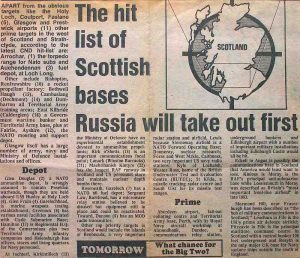This article by Mike Small was first posted on bella caledonia. It highlights the Gadarene stampede to the Right by media commentators following Putin’s invasion of Ukraine. Ian MacWhirter, for a short period a supporter of Scottish independence, but now following his longstanding attacks on public sector workers, followed by transgendered people and environmental activists, thinks we should all follow Douglas Ross and unite behind Boris! This means giving support to a Tory Party up to its necks in providing support to Russian oligarchs, including Putin’s cronies, and whose leaders would be on the first flight to the USA in the event of a nuclear war!
SELF DETERMINATION AND SOVEREIGNTY IN EUROPE
The war in Ukraine has produced another surge in commentary and opinion that the Scottish referendum will never happen; should never happen, and if it ever happens it will surely be lost (etcetera). The SNP are perpetually on their knees, Sturgeon is perpetually ‘over’, and so on (and on).
The logic and the evidence is scarce but given a platform and a relentless deadline to produce copious amounts of negativity, Scotland’s commentariat never fails to deliver.
The arguments come thick and fast, mostly thick. Here is a handful of them.
First the argument is put forward that ‘we’ (undefined) can’t and won’t contemplate constitutional change while a war is being waged in Europe. ‘We’ (undefined) will cleave to the security of Britain, presumably with its broad shoulders and nukes (of which more in a moment).
Second is the argument that the war in Ukraine has exposed the vile nature of ‘nationalism’, as Russian imperial aspirations are shrouded in flag-waving propaganda.
Third is the argument that what Ukraine has shown is the essential nature of the nuclear deterrent. This argument is played out by the Herald’s Iain Macwhirter (‘SNP should call Patrick Harvie’s bluff and scrap the Green coalition’).
Here he argues that: “The SNP’s alliance with the Scottish Green Party has become a liability. Even the most sycophantic of Nicola Sturgeon’s coterie must now see that. The Greens conference at the weekend confirmed that interests and objectives of the SNP and their coalition partners are irreconcilable. The Greens are a party that opposes economic growth in principle, just as the Scottish Government is trying desperately to boost it. The Greens prefer to import Vladimir Putin’s bloodstained oil and gas rather than use our own energy under the North Sea. They want to leave Nato just as the alliance is being threatened by Putin’s missiles. They argue, perversely, that the bloodshed in Kyiv could end if only Nato got rid of its nuclear deterrent.”
Macwhirter has been nurturing a strong hatred of the Scottish Green Party for some time now. They seem to offend him for holding views beyond the centrist agenda which he thinks is acceptable. But it’s a strange brew. It wasn’t so long ago at all that being outside NATO was standard SNP policy and a mainstream part of a nationalist-peace movement tradition. It’s not some whacky outlier, it’s a core part of the Yes movements DNA. Given the reality of climate breakdown Macwhirter’s tirade that “The Greens prefer to import Vladimir Putin’s bloodstained oil and gas rather than use our own energy under the North Sea” just comes over as a bit unhinged. And the writer seems to be entirely ignorant of contemporary debates about growth and de-growth economics which question the credibility of relentless growth on a planet of finite material resources.
But it’s the columnist’s confidence about the ‘madness’ of the Scottish Greens policy on Trident that echoes around British public life with bellicose hubris and exceptionalism.
Trident cannot be used and hasn’t defended the people of Ukraine. Yet it does put a target on our backs. We’ve known this a while. Scottish CND’s ‘Target Scotland’ listed the dozens of likely sites that would be first on Russia’
The argument that Trident is a great success is often asserted but rarely explained.
Scottish CND’s chair Lynn Jamieson has said: “At present, due to the Faslane/Coulport complex, we are a prime target for nuclear attack and the launchpad for the commission of mass murder.” She has stressed that maintaining nuclear weapons was colluding in the “perverted and bankrupt logic of ‘deterrence’” which should have ended with the collapse of the Soviet Union.“The fact that instead nuclear weapons were ‘modernised’ and the Nato nuclear alliance expanded has contributed to Putin’s own distorted view of the world,” she said. Jamieson added that the nuclear weapon system was putting the Scottish population at risk every day in “multiple mundanely deadly and potentially terrifying ways”.
Veteran anti-nuclear campaigner (and bella contributor) Brian Quail, has said: “Trident doesn’t deter anybody from anything,” he said. “It didn’t deter Putin from the madness and cruelty of the Russian attack and will play no part in our and Ukraine’s survival from this nightmare. This must be clear to every sane person.”
To return to the first of the straw men of the ‘impossibility of independence’ – that we must and should cleave to Britain in the current crisis, it doesn’t really make any sense. We live in a world of constant crisis and nothing is achieved by inertia. Capitalism is in perpetual crisis, Britain is in perpetual crisis. To do nothing in the face of this stark reality is just an abdication of agency. There is not going to be some perfect space of contentment in which we can calmly create an oasis in the world for constitutional change. The whole concept mirrors the sheer terror that many Unionists have about discord in political debate, a primal fear that somehow change is terrifying and will unleash demons of which we can scarcely conceive.
This is just a terrible place to be, cowering in the safety of ‘never changing anything’, clinging to the wreckage of the British state and its moribund institutions as the world swirls and morphs and crashes around you. Assuming that ‘dependence’ is a state that will somehow protect us in this harsh world is such a dereliction of the imagination.
If anything the war in Ukraine has exposed Little Britain as the outlier, the exposed and isolated country on the fringes of a Europe that has been drawn together by the battle. Britain is a country exposed as the nation that has acted with bad faith in the face of the refugee demands, while small progressive countries have done the decent thing. Quite why this should make us want to be part of Britain is unknown.
As Boris Johnson embarrasses himself on the international stage, the reality is more prosaic. As James Meek has written (The Power of the New Ukraine): “Since Russia invaded Ukraine on 24 February, much has been made in Britain of the EU’s openness to Ukrainian refugees compared with the barriers put up by London. But it’s a depressing reflection of how mainstream anti-immigrant assumptions have become in the UK that virtually no one in Britain is aware the EU gave Ukrainians visa-free access years ago, as a reward for their country’s sacrifices in Europe’s name. Since 2017, as a result of that and of Brexit, Ukrainians have levelled up and Britons levelled down to identical rights of EU entry: 90 days’ stay without a visa.” Cleaving to Britain in these times is an exercise in self-humiliation and exposure to dangerous risk.
The second of the ‘impossibility of independence’ arguments is that the war in Ukraine has shown the dangers of vile nationalism (sic). Yet even as this is being trotted out the same voices will be adding the blue and yellow flags to their profiles and extolling the absolute principles of ‘self-determination’ and the rights of ‘sovereign nationhood’ which need to be defended, everywhere in the world except … right here.
There’s an irony in all of this that some of the ‘dereliction of the imagination’ from the Unionists side is mirrored within the Yes side.The bleak prospect I have unpicked here actually has some merit with the failure of the SNP leadership to lead the movement it is (nominally) at the head of; failing to resolve the contradictions of its position over (re) entry to Europe; failing to transcend the Growth Commission fiasco; failing to resolve the currency question; failing to campaign, and failing to inspire.
As Jonathon Shafi writes (Independence Captured) the process towards independence has been thwarted on three fronts: “The prospectus for independence has been captured by corporate interests.”
“The political process to achieve Scottish independence has been captured. The SNP prefer to keep the national question on the boil, but not for it to overflow.”
“The domestic policy agenda has been captured. The paralysis that has gripped Scottish politics has had a direct impact on policy making. Even when SNP members vote for initiatives, they are rarely seen through if they amount to real reform. In other cases, their concerns are ignored. Recent examples include the Scottish National Energy Company and “Green Ports.”
The invasion of Ukraine makes a significant argument for Scotland to be an independent nation in Europe, being able to play its part in international affairs and moving towards a resilient economy and a peaceful nation. Being tethered to Britain makes these goals impossible. But we need to make that case and not cede the airwaves and the column inches to the blind and the partial voices of the same few men.
20.3.22
_______
also see:


